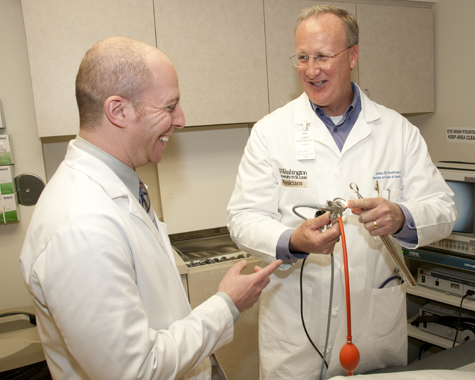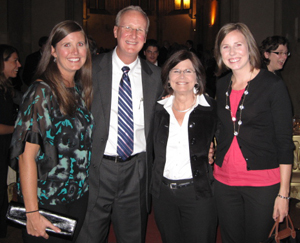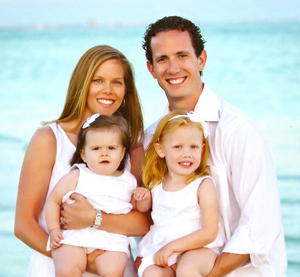
When James Fleshman, MD, was 13 years old, his family moved from Shreveport, La., to what seemed like another world: a small resort town on the coast of Northern Ireland. His father, an engineer, worked for a company involved in oil and gas exploration in the North Sea.
On the trip across the Atlantic, Fleshman devoured a book about the experiences of a young surgeon-in-training at the sprawling Bellevue Hospital in New York City. Immediately, he was captivated by William A. Nolen’s The Making of a Surgeon.
“There was nothing else I wanted to do,” Fleshman says. “Being a surgeon involved decisiveness, self-reliance, skill, leadership, compassion for patients and care for human beings. It fit with everything I was looking for, even at 13.”
Today, Fleshman is chief of colon and rectal surgery and the surgeon-in-chief of Barnes-Jewish West County Hospital, where he has forged close relationships between Washington University physicians and those in private practice.
A highly regarded surgeon in his own right, Fleshman is widely known for developing laparoscopic techniques for colorectal surgery. In a landmark clinical trial, his research also helped to establish that laparoscopic surgery is as safe and effective as conventional surgery for removing colon tumors.
Those who work with Fleshman say he possesses the same characteristics that he so admired in Nolen’s memoir.
“Jim is the epitome of a true leader,” says Timothy Eberlein, MD, the Bixby Professor and chairman of the Department of Surgery, the Spencer T. and Ann W. Olin Distinguished Professor, director of the Alvin J. Siteman Cancer Center and surgeon-in-chief at Barnes-Jewish Hospital. “He leads by example and is a wonderful mentor to faculty he has hired and brought along. He also has developed a fabulous reputation both within and beyond the medical center for providing terrific care to patients.”
A love for education
While Fleshman was not a particularly enthusiastic student in Louisiana, his experience abroad was completely different. The all-boys school he attended was intellectually stimulating, and he easily fit in, despite being the only Yankee in his circle of friends. Fleshman excelled at rugby and cricket and was appointed head boy of his school.
In 1972, after five years abroad and just as violence between Protestants and Catholics began to escalate, the Fleshmans returned to the United States.
“I left there with a love for education,” he says. “It was a very innocent time in Ireland, before the Troubles got out of control.”
The family settled in St. Louis, and Fleshman attended Washington University, graduating in 1976 with a degree in biology. He paid his way through college by juggling two jobs each summer: mowing lawns and doing research. Fleshman spent two summers working in the lab of renowned neuroscientist Ted Jones, MD, PhD. That experience proved instrumental to his acceptance to Washington University’s medical school.
Later, during his surgical residency at what then was Jewish Hospital, Fleshman was drawn to colon and rectal surgery by standouts like Robert Fry, MD, now at the University of Pennsylvania; Ira Kodner, MD, the Solon & Bettie Gershman Professor at the School of Medicine; and Gordon Philpott, MD, now professor emeritus of surgery, all of whom he calls superb mentors.
“These guys did huge abdominal cases every day and were incredibly innovative,” Fleshman says. “They knew their patients, worked extremely hard and were just good people.”
As part of his surgical training, Philpott encouraged his young protégé to spend two years doing basic research in the laboratory. Fleshman readily admits that he didn’t want to do this but is glad he did.
“Had I not done those two years in the lab, I never would have been able to get into academic medicine,” Fleshman admits. “Gordon knew that. It just goes to show how important it is to have mentors in your life.”
Fleshman spent two years in Philpott’s lab, studying in animal models precisely how colon cancer cells respond to different therapies. Philpott says laboratory research teaches physicians to ask important questions and find answers to problems that can’t always be solved by observing patients.
“Jim was an excellent resident,” Philpott says. “He is and always was a superb surgeon and a very caring physician. He had all the right attributes to excel in academic medicine.”
A rewarding career
After a one-year fellowship at the University of Toronto, Fleshman joined the School of Medicine faculty in 1987 and has spent his career tending to patients primarily with colorectal cancer but also treating those with Crohn’s disease and ulcerative colitis.
Fleshman made a name for himself in the early 1990s, when surgeons first began to perform laparoscopic surgery to remove colorectal tumors. Similar procedures had become almost routine for removing gall bladders and spleens, resulting in shorter hospital stays and less pain for patients.

Courtesy photo
The Fleshmans (from left): daughter Cindy; Jim; wife, Linda; and daughter Angie.
But the technique proved trickier for colorectal tumors. Early on, small studies showed that colon cancer patients who had laparoscopic surgery were more likely to have a recurrence of their cancer or develop tumors at or near the 2-inch incision through which the diseased colon is removed.
When many surgeons were ready to throw in the towel, Fleshman helped spearhead the first randomized clinical trial to evaluate laparoscopic surgery in colon cancer patients, and he and others put a moratorium on the procedure outside of the trial. This group also enforced qualification requirements for the surgeons who participated in the study and established standardized operating procedures, developed in part by Fleshman, who tested laparoscopic techniques first in animal models and then in cadavers.
Working in his lab, Fleshman also showed that it was not the surgery itself that caused a resurgence of cancer in some patients but rather surgical mistakes and poor technique.
Results of the clinical trial, reported in the New England Journal of Medicine, showed that the success rate of the laparoscopic approach was virtually identical to that of the conventional surgery.
Fleshman now is leading a nationwide clinical trial comparing laparoscopic surgery to the conventional approach in patients with rectal cancer. Technically, laparoscopic surgery to remove rectal cancer is far more challenging than for tumors in the colon, he says.

Courtesy photo
Fleshman’s son, Brett (right), holding Maren; daughter-in-law Kara, holding Livia.
Reflecting on his nearly 25 years at Washington University, Fleshman says the highlight of his career is training and mentoring younger surgeons.
“It’s a lot of fun to help people realize their goals and dreams and be the best they can be,” he says. “Watching someone I’ve trained set up a new program at an academic institution or be elected to a leadership position in one of the national colorectal surgery associations brings me great satisfaction.”
Those who have worked under Fleshman say he mentors to others just as he was mentored.
“Jim has been extremely supportive of me in my career, both locally and on a national level,” says colorectal surgeon Elisa Birnbaum, MD, professor of surgery. “He’s a tremendous role model and a great problem-solver. That so many patients with colon cancer can have their tumors removed using a laparoscopic approach is a testament to his ability to make sure that the surgery is done properly.”
A devout Christian and devoted family man, Fleshman has remained active in his faith throughout his career. He credits his wife with keeping a steady home life during his early years in training, when their three children were young. Now that the kids are grown, Fleshman says he and his wife enjoy long walks on the weekends and cheering for the St. Louis Cardinals. And each year, they look forward to an annual spring break trip to the beach with their extended family, which now includes two young granddaughters.
Fast facts about James Fleshman
Born: New Orleans
Family: Wife, Linda; Son, Brett, 34, marketing director, Cornerstone Therapeutics Inc., Raleigh, N.C.; and daughters, Cindy, 31, product manager, OsteMed, and Angie, 27, executive director, Ute Trial Ranch Foundation. Both daughters live in Dallas.
Leadership positions: Past president, American Society of Colon & Rectal Surgeons; past president, American Board of Colon and Rectal Surgery; governor of the American College of Surgeons
Hobbies: Golf, St. Louis Cardinals baseball, taking long walks with Linda